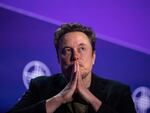
Elon Musk's xAI took over this factory in Memphis, Tenn., earlier this year. This is where it's building a supercomputer to fuel artificial intelligence.
Houston Cofield / Bloomberg via Getty Images
Down a long, flat road in the industrial zone of South Memphis, a newly occupied factory is humming with activity. It’s a low-level white building that spans the length of several football fields. Workers in florescent green vests excavate the surrounding land, and a parade of construction trucks comes and goes. More than a dozen generators steadily burn methane gas.
This part of Memphis, Tenn., is known for its factories and smokestacks. Nearby are a handful of historically Black neighborhoods, where poor air quality has given residents elevated asthma rates and lower life expectancy.
Now, they have a new neighbor: Elon Musk.
He took over the massive factory just a few months ago with the goal of building the “world’s largest supercomputer.” It’s named “Colossus,” sharing the title with both a mutant Russian comic book character and a sci-fi movie about a supercomputer that becomes sentient and goes rogue. The name originally comes from the mythical Greek statue "Colossus of Rhodes."
This data center will supply the compute power for Musk's artificial intelligence company, xAI. It could be a test case of this technology's groundbreaking advances, and also its unintended consequences. AI requires more electricity to complete even simple tasks compared to typical search queries. In the U.S., about 60% of that electricity comes from burning fossil fuels, which is the primary driver of climate change.

Elon Musk's new artificial intelligence company xAI has the stated mission to “understand the universe."
Apu Gomes / Getty Images
xAI launched in July 2023 with the stated mission to "understand the universe" and a plan to "accelerate human scientific discovery." It says it raised $6 billion in funding in May. Since xAI's arrival in Memphis, flight logs show that Musk's private jet has flown back and forth to the city twice a month.
When the supercomputer gets to full capacity, the local utility says it's going to need a million gallons of water per day and 150 megawatts of electricity — enough to power 100,000 homes per year. Last week, Musk posted on X, the social platform formerly known as Twitter, that Colossus was brought online over Labor Day weekend, saying "from start to finish, it was done in 122 days."
“Moreover,” he added, “it will double in size.”
xAI's central focus is a tool called Grok. It's an AI chatbot, similar to ChatGPT, that the company flaunts as "having a sense of humor." Musk has called it the "most fun AI in the world." It has fewer rules than other AI chatbots and has been known for creating controversial deepfake images, such as Mickey Mouse as a Nazi and Kamala Harris in lingerie.
The primary purpose of the Memphis supercomputer is to provide compute power for Grok.
The project has moved at breakneck speed and has been cloaked in mystery and secrecy. Musk has yet to make a public appearance, and officials from the local utility who were briefed on the project signed nondisclosure agreements, according to the utility's spokeswoman. The NDAs were first reported by Forbes. The news dropped on Memphis in a press conference in June that was announced with little notice and caught members of the City Council, environmental agencies and the community off guard.

KeShaun Pearson is the president of Memphis Community Against Pollution, which works on environmental advocacy in the city's historically Black neighborhoods.
Ariel J. Cobbert / for NPR
“We have been deemed by xAI not even valuable enough to have a conversation with,” says KeShaun Pearson, who grew up a few miles from the facility and is president of the local nonprofit Memphis Community Against Pollution. “To not even be included in conversations about what is transpiring in our own backyards.”
Musk and xAI did not return requests for comment.
The limited oversight and rushed nature of this project have allowed xAI to skirt environmental rules, which could impact the surrounding communities. For instance, the company’s on-site methane gas generators currently don’t have permits.
“Artificial intelligence may be a cutting-edge technology,” says Amanda Garcia, a senior attorney with the Southern Environmental Law Center. “But it’s imposing the same kinds of pollution burdens on communities that industrial sources have been for the past 100 years.”
City Council kept in the dark
Memphis Councilwoman Yolanda Cooper-Sutton was in her living room watching the evening news on June 5 when a report came on that made her sit up in her chair. The city’s local chamber of commerce was announcing that xAI was moving to Memphis to build its “Gigafactory of Compute.”
“I’ll give you a perspective,” Ted Townsend, the CEO of the Greater Memphis Chamber, said in a press conference that day. “If you take the two largest supercomputers in the world and you combine them, and you multiply that by four — that’s what we’re building here in Memphis.”
Cooper-Sutton says she couldn’t believe her ears. This was the first time she’d heard anything about the project.
“Wow,” she says, recalling her feelings that day. “One word. Wow.”

Memphis Councilwoman Yolanda Cooper-Sutton represents the district where the xAI supercomputer factory is located.
Ariel J. Cobbert / for NPR
Cooper-Sutton wasn’t the only one who’d been kept in the dark. Community leaders and other City Council members told NPR they also didn’t find out until the night before or day of. Those who were in the loop include the chamber, Memphis Mayor Paul Young and representatives from the local and state utilities.
At first, details were scant. During the June press conference, when a reporter asked where the supercomputer would be located, Townsend said that “due to global security concerns, we are not at liberty to identify the location.” He said the project was a “multibillion-dollar investment” in Memphis, and the number of jobs generated and investment specifics were still being calculated by xAI.
A spokeswoman for the chamber declined to answer NPR’s questions.
It's since been announced that xAI took over a former manufacturing facility that was run by the company Electrolux. The local utility says xAI will generate 300 jobs; although it's unclear whether these are temporary or permanent. Currently, the company has 37 job listings and the majority are based in California. Data centers are highly automated, so they have few employees. Microsoft, for example, says it employs about 50 workers per facility.
Mayor Young told NPR in an email that xAI has “chosen to go the no-incentive route, which means that they will pay the full amount for property taxes.” He said he sees Musk choosing Memphis as an endorsement of its “get-it-done attitude.”
“Elon and his team dream big, and we love that,” the mayor said. When NPR asked for more information on the project plans, he said, "it is probably best to leave any forward planning discussions related to the overarching vision to Elon and his team.”
how june started & how it’s going
— xAI (@xai) July 2, 2024
come 🧑🍳 with us at xAI & 𝕏 if you like building & running the biggest computers in the world!https://t.co/E9BY2xFmcLhttps://t.co/NU05SX5tVb pic.twitter.com/qFMpJcizw2
After community outcry, the local utility (Memphis Light, Gas and Water, or MLGW) issued fact sheets and participated in a community forum. It laid out how much electricity and water xAI will use and says residents won't be impacted. It added that the increase in electricity sales means $500,000 more for Memphis annually. MLGW says it has seven contracts with xAI, including for electricity, water, gas and use of the gas pipeline.
NPR requested these contracts and a spokesperson said to file a public records request. NPR’s subsequent public records request was denied on account of not being a citizen of Tennessee.
Cooper-Sutton says she eventually met with representatives from xAI and the chamber, but still doesn’t have concrete answers around how this project came about, the timeline of events and why the city of Memphis wasn’t made aware of the deal before it was set. She says she asked to meet with Musk, since he’s the head of xAI, but is still waiting for that to happen.
“I have an old saying from my grandparents: What it won't get in the wash, it’ll take care of in the rinse,” she says. “So, if there's any secrets and if there's a dead cat on the line — it’ll soon show up.”
“Southwest Memphis is ground zero”
One mile from xAI, across a stretch of the Mississippi floodplain and a thicket of towering hardwood forest, is one of Memphis' oldest neighborhoods. It's called Boxtown. The southwest Memphis community was first started in the aftermath of the Civil War by formerly enslaved people. They later built homes from leftover boxcars. Boxtown still houses the oldest church in Memphis.
Today, it’s a leafy neighborhood that has the feel of a tight-knit community. It’s sprinkled with modest brick and wood-paneled homes that have tidy yards. Some hang American flags out front; others have charcoal smokers. KeShaun Pearson grew up nearby and has spent a lot of time here.
He’s 35 years old, tall and lean. Pearson is also disarmingly friendly, speaking to every stranger he comes across. As he slowly drives through Boxtown, he points things out. There’s the community garden and a tiny white house that looks like it could almost be original architecture.
“My grandmother is buried down that road,” he says. “God rest her soul.” Both of Pearson’s grandmothers died of cancer in their 60s and he’s convinced it had to do with living in South Memphis.

KeShaun Pearson in Boxtown, the neighborhood where his grandmother is buried.
Ariel J. Cobbert / for NPR
The cancer rate in South Memphis is four times higher than the national average, according to a ProPublica report. And a 2020 University of Memphis study found the life expectancy here is 10 years lower than other parts of the city. South Memphis also has elevated asthma rates, and the American Lung Association gave it a failing grade for air quality. Experts say this is largely due to the neighborhood's proximity to Memphis' industrial zone.
Down the road from xAI, there’s a decommissioned coal plant where the city is still dealing with issues from coal ash, and there’s a steel mill, an oil refinery, a wastewater facility and the state’s power plant.
It's common for the county health department to issue "code orange" ozone alerts here. This means ozone levels exceed the Environmental Protection Agency's safety standards and sensitive groups, like adults with respiratory issues and children, shouldn't go outside.
“They have a very serious air pollution problem,” says Garcia from the Southern Environmental Law Center. “Southwest Memphis is ground zero.”
Garcia, Pearson and other environmental justice advocates fear that xAI will add to the pollution burden of this already overburdened community, because of its high demand for energy. They say it’s particularly concerning that the project has had little government oversight and the community has been left out of the process.
“It's frustrating because it could be better,” Pearson says. “The dissonance of having essentially the future of technology powered by fossil fuels is, you know, it just leaves me speechless.”
xAI adds gas generators without a permit
The factory that xAI now inhabits sits on 217 acres of land and has the possibility to add an additional 580 acres. The main building is 785,000 square feet (roughly the size of 13 football fields) and comes with a cooling tower, heavy electrical power feeds and is fully air-conditioned. Phoenix Investors, which is leasing the site to xAI, didn’t respond to a request for comment.
Alongside the factory are at least 18 portable methane gas generators, which visibly emit a steady stream of hazy smoke into the air. These turbines help fuel the company’s AI.
They started to appear in June and have multiplied over the last couple of months. According to the Southern Environmental Law Center, it's estimated these generators can provide enough electricity to power 50,000 homes. And they have the capacity to emit 130 tons of harmful nitrogen oxides per year, potentially making them a major source of the pollutant in Memphis.
xAI doesn’t have air permits for these turbines, according to the Shelby County Health Department and the Environmental Protection Agency.
The county health department told NPR that it only regulates gas-burning generators if they’re in the same location for more than 364 days. “Given the mobile nature of the gas-turbines in question … [the health department] does not have current permitting authority,” a spokeswoman wrote in an email. She said this is the Environmental Protection Agency’s jurisdiction.
The Environmental Protection Agency told NPR it hasn’t issued air permits for these turbines, but after getting inquiries from media outlets and citizen groups it’s “looking into the matter.”

LaTricea Adams founded Young, Gifted & Green, which works on environmental justice and climate change issues in Black and brown communities.
Ariel J. Cobbert / for NPR
LaTricea Adams is from South Memphis and says she was shocked to hear about the generators. She’s a member of the White House Environmental Justice Advisory Council and founder of the nonprofit Young, Gifted & Green.
“Now you have turbines, but you don’t have an air permit. Like, in what universe is that acceptable?” she says. “It’s like the Spider-Man meme, where everybody's pointing at each other, but the community is who's losing.”
This isn’t the first time one of Musk’s companies didn’t have permits for high-emissions machinery.
His spaceship company SpaceX was fined for allegedly discharging industrial wastewater numerous times in Texas without a permit, according to a spokesperson for the Texas Commission on Environmental Quality. This was first reported by CNBC. The Boring Co., which is his underground tunneling business, was also fined in Texas for failing to get a permit to discharge industrial stormwater. And his electric car company Tesla was cited by California for 33 air quality violations.
“There's a way to do this right,” says Adams. “I don't think that all is lost, but it’s going to take all of the powers that be to be more transparent and make this mutually beneficial.”
Artificial intelligence puts a strain on the grid
On a sweltering August day, KeShaun Pearson drives down the flat road to xAI. As he pulls up, he points across the street to a multibuilding power plant owned by the Tennessee Valley Authority. This is the state utility that ultimately has to approve xAI’s power plan.
Typically, data centers the size of xAI have to wait years before they can get on the grid, according to a report by Bloomberg. That's because utilities need to ensure that the facilities won't strain the grid for residents and other customers.
xAI has already gotten the go-ahead for 50 megawatts of electricity from MLGW. But it’s requesting 100 megawatts more — enough to power tens of thousands of homes — and for that, xAI needs Tennessee Valley Authority’s approval.
A spokesman for the utility says it’s reviewing xAI’s electricity demands and is waiting for more information from the company.
This weekend, the @xAI team brought our Colossus 100k H100 training cluster online. From start to finish, it was done in 122 days.
— Elon Musk (@elonmusk) September 2, 2024
Colossus is the most powerful AI training system in the world. Moreover, it will double in size to 200k (50k H200s) in a few months.
Excellent…
Musk says xAI has already dealt with “power fluctuation issues.” During an interview with podcaster Lex Fridman last month, he said that training his AI necessitates quick bursts of 10 and 20 megawatts of electricity and “the electrical system freaks out about that.”
Water is another issue for xAI. Data centers use massive amounts of water to cool their servers; xAI says it will need 1 million gallons of water a day, which is about 3% of the total capacity of the local wellfield, according to the nonprofit Protect Our Aquifer. This is the same wellfield that provides drinking water to residents.
“It would put stress on the wellfield,” says Scott Schoefernacker, science director for Protect Our Aquifer. He adds that “a lot of the water is just being used as cooling and it evaporates.”
MLGW is adamant that xAI won’t impact the grid or water availability. It also says it’s in talks with the company to build a gray water plant to use treated wastewater for cooling, along with the installation of large-scale batteries for electricity storage.
Several tech companies, including Google and Microsoft, have started using renewable energy sources at their data centers but still mostly rely on fossil fuels. According to the Bloomberg report, one of the reasons for that is because AI’s demand for energy is so high that renewable energy suppliers can’t keep up.
After watching xAI's buzzing construction activity for a while, Pearson starts up the car and drives back through the industrial zone. He points to a dense forest in the distance where 50-foot-tall trees, hanging with vines, tower over the landscape. He explains that this is T.O. Fuller State Park and that it was the first state park east of the Mississippi for Black people.
Now, he says, it’s impossible to enjoy because of all of the pollution from nearby factories.
Copyright 2024 NPR